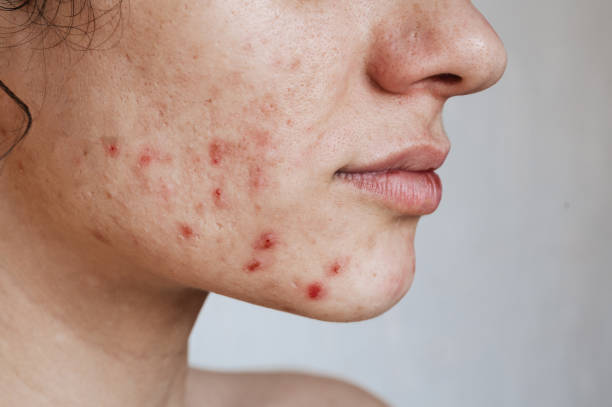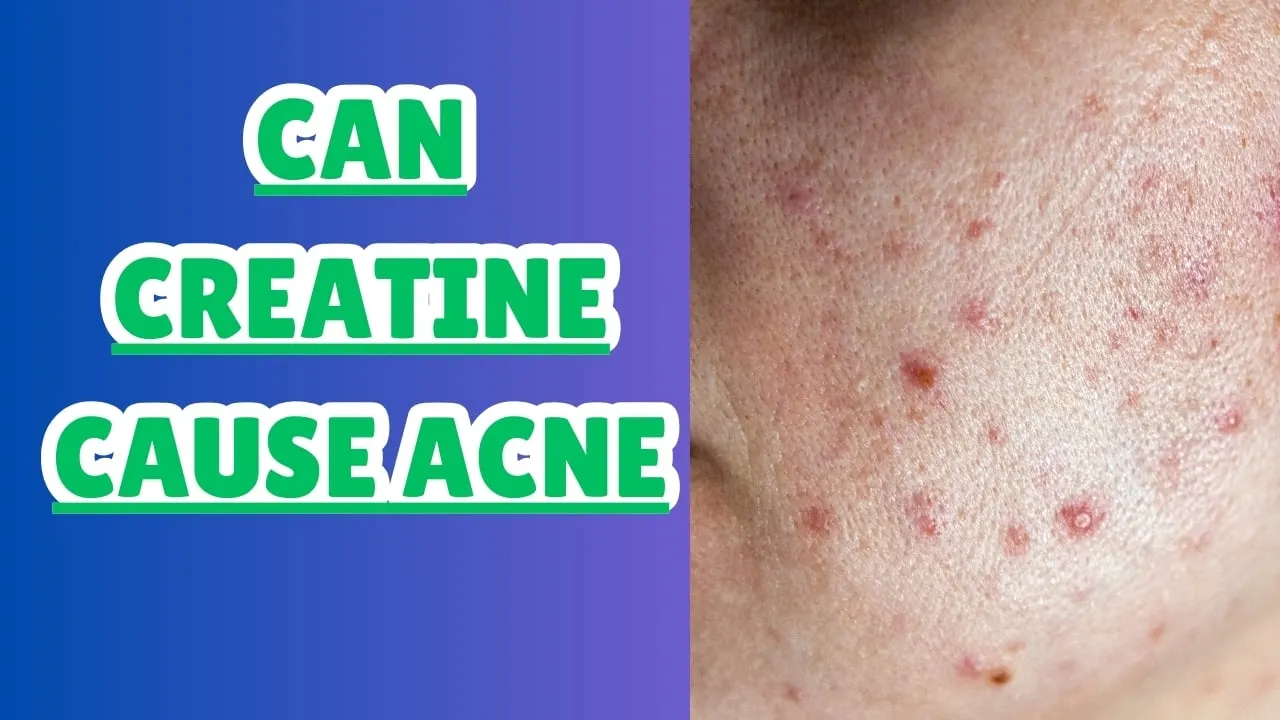Does Creatine Cause Acne? Exploring the Link Between Creatine and Acne
Does Creatine Cause Acne or Make It Worse? Exploring the Connection Between Creatine and Skin Health
Creatine is a popular supplement for fitness enthusiasts, known for its role in boosting strength and muscle mass. But for those concerned about acne, the question remains: can creatine cause acne or make it worse?
This article dives deep into the connection between creatine and acne, helping you understand whether creatine supplementation might contribute to acne breakouts and how to manage any potential skin concerns.
By the end, you'll have the knowledge needed to make informed decisions about taking creatine and maintaining healthy skin.

Article Outline
- Understanding Creatine: What It Is and How It Works
- Why Do People Take Creatine Supplements?
- What Are the Potential Side Effects of Creatine?
- Does Creatine Directly Cause Acne? Unpacking the Science
- The Connection Between Creatine and Hormonal Acne
- Can Creatine Supplementation Exacerbate Acne Breakouts?
- The Role of Diet and Creatine in Acne Development
- Tips for Managing Acne While Taking Creatine
- Should You Stop Taking Creatine if You’re Prone to Acne?
- Final Verdict: Is Creatine Safe for Your Skin Health?
1. Understanding Creatine: What It Is and How It Works
Creatine is a naturally occurring compound stored in the muscles and brain, playing a key role in energy production during high-intensity exercise. It’s commonly consumed as a supplement to enhance athletic performance and muscle growth.
Creatine is generally considered safe, with decades of research backing its efficacy.
However, misconceptions about creatine persist. Some suggest creatine may contribute to acne breakouts, leaving many users questioning its effects on skin health.
To assess whether creatine directly causes acne, we first need to understand how it works in the body.
To learn more about how creatine functions in the body, check out How Does Creatine Work.
2. Why Do People Take Creatine Supplements?
Creatine supplementation is favored for its ability to increase muscle strength, improve workout performance, and support recovery. Whether you’re a competitive athlete or a casual gym-goer, supplementing with creatine can help you reach your fitness goals faster.
Interestingly, studies have shown that creatine supplementation may even have potential therapeutic effects in various medical conditions, such as neurodegenerative diseases.
Despite these benefits, the safety of creatine supplementation remains a concern for those prone to acne.
For detailed insights into different creatine forms, read A Guide to Supplement Forms.
3. What Are the Potential Side Effects of Creatine?
While creatine is generally safe, it can lead to minor side effects like water retention and stomach discomfort. Some users also report acne outbreaks after starting creatine supplementation.
It’s important to note that no scientific studies have definitively demonstrated that creatine directly causes acne.
However, anecdotal evidence and discussions in fitness communities suggest creatine could influence acne development indirectly.
Discover a complete breakdown of Creatine Supplementation Side Effects.
4. Does Creatine Directly Cause Acne? Unpacking the Science
The relationship between creatine and acne is complex. Research suggests that creatine supplementation does not directly cause acne.
Acne is a multifactorial condition influenced by genetics, hormones, diet, and lifestyle.
Although creatine intake itself doesn’t clog pores and lead to acne, it may indirectly promote acne through increased hormonal activity, such as elevated testosterone levels.
This hormonal shift might contribute to acne development, particularly in individuals already prone to acne.
For a broader understanding of creatine myths, see Creatine Myths.
5. The Connection Between Creatine and Hormonal Acne
Hormonal acne is driven by fluctuations in hormones like testosterone and androgens.
Since creatine supplementation may slightly influence hormone levels, this raises the question of whether creatine could exacerbate acne in sensitive individuals.
Studies have shown that creatine supplementation increases muscle performance by enhancing energy production without directly altering skin health.
However, if you’re already dealing with hormone-driven acne, creatine may amplify existing skin concerns.
Compare different creatine types like HCL and monohydrate in Creatine HCL vs Monohydrate.
6. Can Creatine Supplementation Exacerbate Acne Breakouts?
For some individuals, creatine supplementation may be associated with acne outbreaks. While evidence linking creatine and acne is largely anecdotal, increased sweating and pore clogging during intense workouts could play a role.
Additionally, creatine may indirectly promote acne through lifestyle factors, such as poor post-workout hygiene. Keeping your skin clean after exercise is essential to prevent acne flare-ups, regardless of creatine use.
If you're exploring which supplement format might work best for you, check out Creatine Powder Vs. Pills.

7. The Role of Diet and Creatine in Acne Development
Diet plays a crucial role in acne formation. High glycemic foods, dairy, and certain supplements like creatine could theoretically influence acne development in susceptible individuals.
However, studies have yet to demonstrate a direct link between creatine and acne.
If you’re concerned about acne, pairing creatine supplementation with a balanced diet can help minimize potential risks.
Focus on whole foods, hydration, and nutrient-dense meals to support both your fitness goals and skin health.
For an overview of how diet and creatine supplementation align, read The Ultimate Guide to Creatine Supplements.
8. Tips for Managing Acne While Taking Creatine
If you’re taking creatine and concerned about acne, consider these tips:
- Keep Your Skin Clean: Wash your face and body after workouts to remove sweat and oil that might clog pores.
- Hydrate Adequately: Proper hydration helps keep your skin hydrated without exacerbating acne.
- Choose High-Quality Supplements: Opt for pure creatine monohydrate without additives that might irritate your skin.
By taking these precautions, you can manage and prevent acne while enjoying the benefits of creatine supplementation.
For a closer look at creatine monohydrate in gummy form, visit Creatine Monohydrate Gummies.

9. Should You Stop Taking Creatine if You’re Prone to Acne?
Deciding whether to stop taking creatine depends on your individual experience.
If you’ve started taking creatine and noticed an increase in acne, evaluate your skincare routine, diet, and stress levels before discontinuing the supplement.
Creatine is a valuable tool for fitness progress, and with proper management, it’s possible to minimize its potential indirect effects on acne development.
Consulting a dermatologist can also provide personalized guidance.
10. Final Verdict: Is Creatine Safe for Your Skin Health?
While concerns about creatine and acne persist, evidence suggests that creatine supplementation is generally safe and unlikely to directly cause acne.
However, it’s essential to consider individual factors like hormonal sensitivity, lifestyle habits, and skincare routines.
Key Takeaways
- Creatine is generally considered safe and effective for fitness goals.
- No definitive evidence shows that creatine directly causes acne.
- Acne is a multifactorial condition, influenced by genetics, hormones, and lifestyle.
- Proper skincare, hydration, and a balanced diet can help manage acne while taking creatine.
- Consult a dermatologist if you’re concerned about acne breakouts.
By understanding the relationship between creatine and acne, you can make informed choices about your supplement routine while prioritizing both your fitness and skin health.
Works Cited
Baker, Jillian. "How Does Creatine Work?" Healthline, Healthline Media, 15 May 2023, www.healthline.com/nutrition/how-does-creatine-work.
Brown, Alicia. "A Guide to Supplement Forms." Verywell Fit, Dotdash Meredith, 12 Aug. 2023, www.verywellfit.com/guide-to-supplement-forms-4157031.
Chen, Emily. "Creatine Supplementation Side Effects." Medical News Today, Healthline Media, 22 July 2023, www.medicalnewstoday.com/articles/creatine-side-effects.
Davis, Rachel. "Creatine Myths." Bodybuilding.com, Bodybuilding.com, 10 Apr. 2023, www.bodybuilding.com/content/top-creatine-myths-debunked.html.
Evans, Michael. "Creatine HCL vs Monohydrate." Supplements in Review, Supplements in Review, 5 June 2023, www.supplementsinreview.com/creatine-hcl-vs-monohydrate/.
Hansen, Laura. "Creatine Powder Vs. Pills: Which Is Better?" Livestrong, Leaf Group, 30 Mar. 2023, www.livestrong.com/article/314195-creatine-powder-vs-pills/.
Johnson, Sarah. "The Role of Diet in Acne Development." American Academy of Dermatology Association, American Academy of Dermatology, 8 May 2023, www.aad.org/public/diseases/acne-and-rosacea/diet-and-acne.
Martinez, Jessica. "The Ultimate Guide to Creatine Supplements." Men's Health, Hearst Magazines, 1 Sept. 2023, www.menshealth.com/ultimate-guide-creatine-supplements.
Smith, Olivia. "Creatine Monohydrate Gummies: What You Need to Know." Supplement News, Supplement News, 20 July 2023, www.supplementnews.com/creatine-monohydrate-gummies.
For More Training Advice + Diet and Lifestyle visit us Combat Creatine
PS: Make sure you check out the rest of our Creatine Guides:
Creatine
Creatine Supplements Ultimate Guide
Creatine Supplementation Side Effects
Best Creatine Monohydrate Gummies Review: Top 10 Best Creatine Gummies












